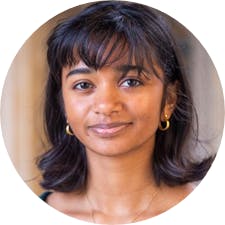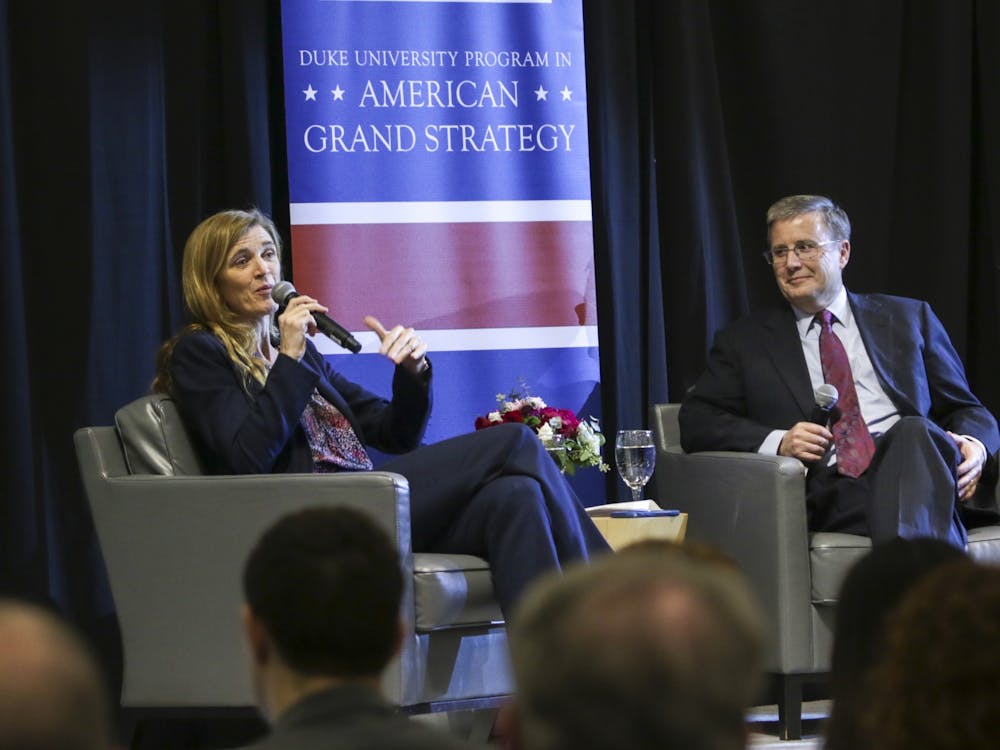Samantha Power, former U.S. ambassador to the United Nations, spoke to a packed audience at Penn Pavilion Tuesday night about her career and latest memoir.
Power, a Pulitzer Prize winner, was featured on Time’s 2004 list of the 100 Most Influential People. She was also a human rights adviser in the administration of former President Barack Obama and currently works as a professor of the practice of global leadership and public policy at Harvard Kennedy School. Her memoir, “The Education of an Idealist,” was released in early September.
“I did not think, ‘One day, I’m going to be a UN ambassador’ or ‘I’m going to be a human rights lawyer.’ My epiphany was so much more modest,” said Power, who in her early days wanted to become a sports announcer.
However, after seeing kids her age mowed with tanks in Tiananmen Square and images from concentration camps in the Balkans 50 years after the Holocaust, she came to a realization that there’s “more to life than sports.”
Power emphasized the importance of showing the human side of policymaking, which can motivate young people who may otherwise feel small, make a difference. We only hear about the human factor when there’s a foreign policy disaster, she added.
“If you create a fuller picture, there are parts of what any human is going through that are universalizable,” she said.
However, as a woman in a male-dominated space, Power often encountered bumps along the way.
Power said that although her professional life isn’t typical, many can relate to her “inner life,” her “torment” and her “sense of being torn in multiple directions.” She recounted when her son nagged her while she was on call with the secretary of state, a story she said has led many women who work from home to empathize with her.
Power touched on how she has always occupied male-dominated spaces, though she emphasized that her recognition of her place in them has shifted over time. As a war correspondent in Bosnia, she encountered several women in the field, but it was only in Obama’s White House that she first fully encountered and recognized the male-dominated space.
“Because of the pipeline in national security, largely, but also because we were in such a rush to hire that we didn’t slow the hiring process down sufficiently at the highest levels…there were 26 senior directors and six were women,” Power said.
Only through weekly meetings with the women and a subsequent growing sense of community was she able to realize that the gender dynamics were “pretty crummy.”
Additionally, Power’s status of coming into the Obama administration as a Pulitzer Prize winning author meant that more watchful eyes were upon her. The simple fact that Power had been a journalist generated suspicion.
Once, as she was taking scrupulous notes during a meeting, a senior person in the room asked Power if what she was writing was for a future memoir.
“It was as if I were a mole, or an enemy within or that my interests were not the country’s interest,” she said. “It was so mortifying.”
Even so, Power’s outsider perspective didn’t mean that she was naïve when it came to criticizing policy. Even though she was an outsider, Power said that she spent virtually a decade interviewing people and though her writing was always critical, it tried to contextualize the policy choices.
“It wasn’t like I came into government thinking ‘Oh, this is going to be so easy,’” Power said, but she felt that her insights from the outside could serve to help.
One of these ideas included elevating proposals to do small initiatives. The direct application of these ideas came in the form of a “toolbox”—a set of policies like peacekeepers, contact groups and visa bans that could be employed in the face of mass atrocities and genocide.
When asked about foreign policy taken by the current administration that will be judged most kindly in the future, Power lauded the greater use of leverage, defining it as “that spirit of asserting your interests and being more willing to put more on the line on behalf of [your citizens].”
Although she doesn’t agree with the way it has been conducted—specifically citing the harm the trade war with China has caused—she recognized that the previous administration had been “more accommodationist.”
Above all, Power stressed the importance of idealism in public service.
“They’re trying to make their country better, they’re trying to look out for the welfare of their citizens, they’re trying to improve something somewhere,” she said. “I don’t know anyone in government who’s like ‘Yeah, it’s going pretty well out there.’”
Editor's Note: The Program in American Grand Strategy hosted Power for its Fall 2019 Dave and Kay Phillips Family International Lecture Series.
Get The Chronicle straight to your inbox
Signup for our weekly newsletter. Cancel at any time.

Preetha Ramachandran is a Trinity senior and diversity, equity and inclusion coordinator for The Chronicle's 118th volume. She was previously senior editor for Volume 117.

